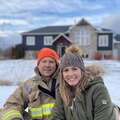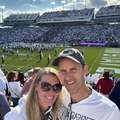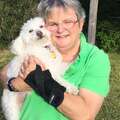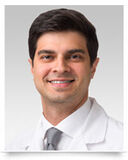Patient Insight: 10 Spiritual Lessons I Learned From Heart Surgery
Written By: Adam Pick, Patient Advocate, Author & Website Founder
Published: October 2, 2024
The patients in our heart valve community never cease to amaze me. I could ramble on about what I just received in my inbox from Cuauhtemoc Velazquez, a patient from Toronto, Canada. Instead, I will simply provide you this wonderful opportunity to watch an extraordinary video that Cuauhtemoc shared with me titled, “10 Spiritual Lessons I Learned From Heart Surgery”.
Amazing, right?
I mean that video is downright amazing!!!!
I cannot thank Cuauhtemoc for sharing his story, his 10 spiritual lessons and this video with all of us.
Personally, I could relate to so much of what Cuauhtemoc shared in this video.
Related Links:
- Patient Alert: David Warns You About Cardiac Amyloidosis
- Patient Story: Deborah’s “Night & Day” Difference with Dr. Trento
- Patient Update: Koert Travels from California to New York for Ross Procedure
- Patent Insight: Lynn’s 5 Lessons Learned from Complex Valve Surgery
Keep on tickin’ Cuauhtemoc!
Adam
P.S. For the deaf and hard-of-hearing members of our community I have provided a written transcription of this video below.
The heart goes something like this… But during a medical checkup I was told mine had a murmur. so I decided to listen to what my heart had to say through an echocardiogram. When the cardiologist put the thingy on my chest, I heard a swishy swishy sound. Oh sh*t. He diagnosed a congenital bicuspid aortic valve with stenosis and severe insufficiency.
The aortic valve is a three-cusp structure that regulates the flow of blood coming out of the heart into the aorta, which distributes oxygenated blood to the rest of the body. But some people like me are born with an abnormal number of cusps, which puts pressure on the valve, narrowing the opening for blood to pass.
My valve was also leaky, so a lot of the blood regurgitated back, causing my heart to work overtime. The solution? Open heart surgery. Replacing my aortic valve with a mechanical valve, and take anticoagulants for the rest of my life to prevent blood clots.
Why me? Will I survive this? I don’t want to die. I wallowed in self-pity over the next few days, but eventually realized there’s no point in fighting reality. These were the cards that life had dealt me.
How can I give myself the best possible chance to overcome this? If I have to go through this, I might as well squeeze as many lessons as I can from this experience. I started to walk a long winding road of a bunch of medical tests, including pretty invasive ones, like a hospital angiogram, which proved to be a great practice for the real deal.
It turned out I was a good candidate for the Ross Procedure, an operation where they replace your defective aortic valve with your own pulmonary valve. And then use a donor valve to replace it. I did my due diligence and did everything I could to get in the best possible shape before the surgery. I worked out, ate healthy whole foods, eliminated unhealthy habits, slept well, joined online support groups, did a lot of meditation, and kept visualizing and planning my recovery.
I also had to be assertive and navigate my way through the healthcare system to get the best possible care for my heart. After much uncertainty, I was seen by the King of Hearts, Dr. Tirone David, a legend in cardiovascular surgery and an expert on the Ross procedure. The surgery date was set, November 8th, 2023.
Taking action and preparing helped me gain a sense of certainty and control before the surgery. But the last thing I needed to do was the opposite. My parents and my brother flew in from Mexico a few days before the surgery. And with their support, I had to trust and let go. Knowing that I had done everything in my hands to prepare.
It was now the time to put my life in the hands of professionals and trust God. Trust the universe. Western Medicine. La Virgencita de Guadalupe. Eastern spirituality, crystals that I kept near my heart, and the love and prayers from friends and family.
On the day of, I was mostly numb and focused on going through the motions. My fears and anxieties took a backseat, and I became fully disassociated, witnessing everything as if it was happening to somebody else.
I saw Dr. David before the surgery and took the chance to ask him a very important question. “When you cut my chest open, Could you give me a scar in the shape of a thunderbolt, like Harry Potter?” He laughed and said, “No”.
I was brought to the operating room where over ten people were busy getting ready. They held me onto the cold operating table and put a gas mask over my face. I tried to relax but my mind clung to consciousness for dear life. Luckily, they injected a powerful chemical and I fell into an immediate and deep slumber.
An incision was made on my chest. My sternum cut in half. My veins and arteries connected to a bypass machine that oxygenated my blood while my heart stopped beating. Dr. David opened my heart. And for five hours, he intricately cut and stitched together my pulmonary valve into the aortic position. while a donor valve was put in its place.
Everything was going great, but all of a sudden, my blood would not clot and I began to lose a lot of it. On the waiting room, screens were showing the status of ongoing surgeries like planes arriving and departing at an airport. My mom was in deep prayer, while my father and my brother were looking at each other nervously.
It was taking longer than expected.
My mom recounts that she felt something was off as if I was quote unquote leaving and used all of her love and mind to bring me back with her gentle mother voice fell like a deep sleep with no dreams and the sweetest feeling of not existing for a while.
Somebody gently touched my hand and I opened my eyes. I was on the “other side”.
The next few days were rough. I had nausea, extreme fatigue and a raw heart. For the next 48 hours, my only tasks were to attend to medical tests and trying to survive. Whenever the sensations were too much, I’d remind myself of one mantra, mind over matter. Mind over matter. Mind over matter. I spent five more days recovering in my hospital room, where the excellent and dedicated team of doctors and nurses at Toronto General Hospital’s Cardiac Centre gave me the best care I could ask for.
Nights were difficult, with uncomfortable positions, sweating, and weird dreams caused by the opioid medication. With my family and friends company, eventually, I was released and was able to get back home. I obsessively began tracking my vitals and took my medication diligently. The physical recovery was not as difficult as the emotional one.
I felt a lot of anger that sometimes turned into rage. Perhaps my body lashing out at not being able to fight or flight throughout the ordeal.
Nothing could’ve replaced the love and care I got from my mom, which turned out to be the best medicine. I had to learn to receive a lot of attention and care. and even wrote a heartfelt letter to the pulmonary valve donors family letting them know I’d honor their loved one’s life by making the best of mine.
Every day I’d go on walks. First just around the corner and before I knew it I could trek Toronto at a comfortable pace. Every day I felt a little bit better and while most of my days were good. It was hard to be patient and understand that this was my life for the next few weeks.
Eventually, I felt strong enough to go to my home country Mexico to soak in the sun. With a lot of time on my hands, I did a lot of emotional work. Through the magic of pen and paper, I confronted other kinds of heart conditions, like external pressure, feeling not good enough, feeling unlovable, pressure and insufficiency, perhaps the physical weirdly reflecting the emotional.
I took advantage of this rawness to think about healing in a deeper sense, my role in my family and my next few steps in life. Indulging in Oaxacan food and constant sunshine, I really thought about my priorities and what I wanted out of life.
I came back to Canada and encountered a setback, atrial fibrillation, an irregular flutter in my heart that sent me panicking to the emergency room. Completely shattering the narrative that I was pretty much recovered. Luckily, it was a somewhat common side effect of surgery that usually results on its own, but it humbled me and plunged me into a depression for two weeks. Little by little, through lifestyle habits and pushing myself despite being unmotivated, I was able to come out of it. The follow-up appointments with my surgeon and cardiologist helped me solidify the feeling that everything was alright.
And with their blessing, I started to work out more confidently, which made me feel like I was back to normal. I understood that we should not strive for perfection. I’m still taking blood pressure medication, but I’ve decided to move forward. To make the choice that I’m alright, that my heart is healed, and that I can face any challenge ahead of me.
I wanted to share my story in part to build the narrative around it and give it meaning. Like they do in the Japanese art of Kintsugi, I wanted to coat my scars in gold, and value this whole experience for the lessons I learned from it. But also, to share these lessons that might help others. You, whether you’re facing a health challenge or even a different type of heartbreak altogether.
This experience has made me take inventory of my life and remember it’s precious and fragile, and how important it is to do what makes us happy. So the single most important lesson I learned from this experience is to listen to my heart.













